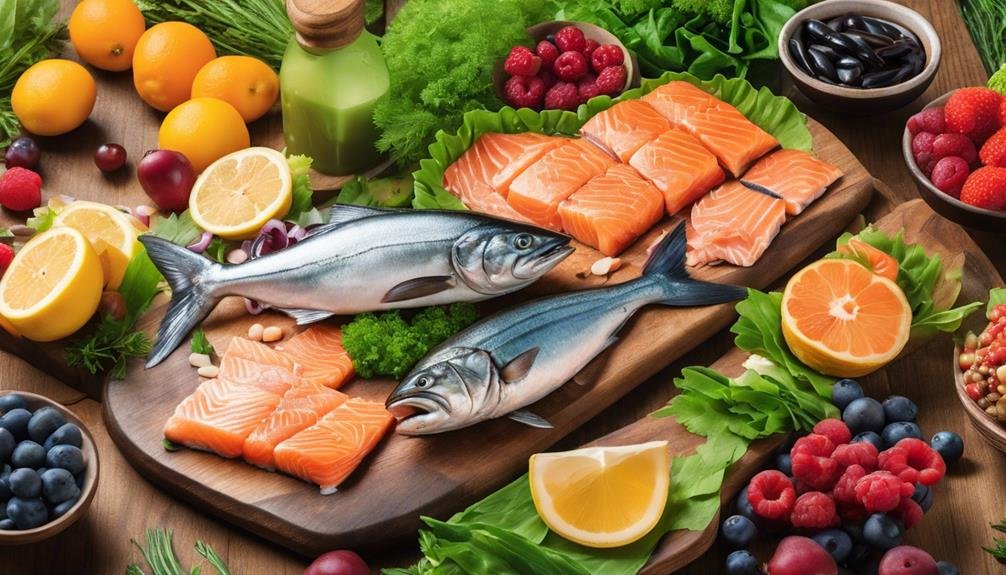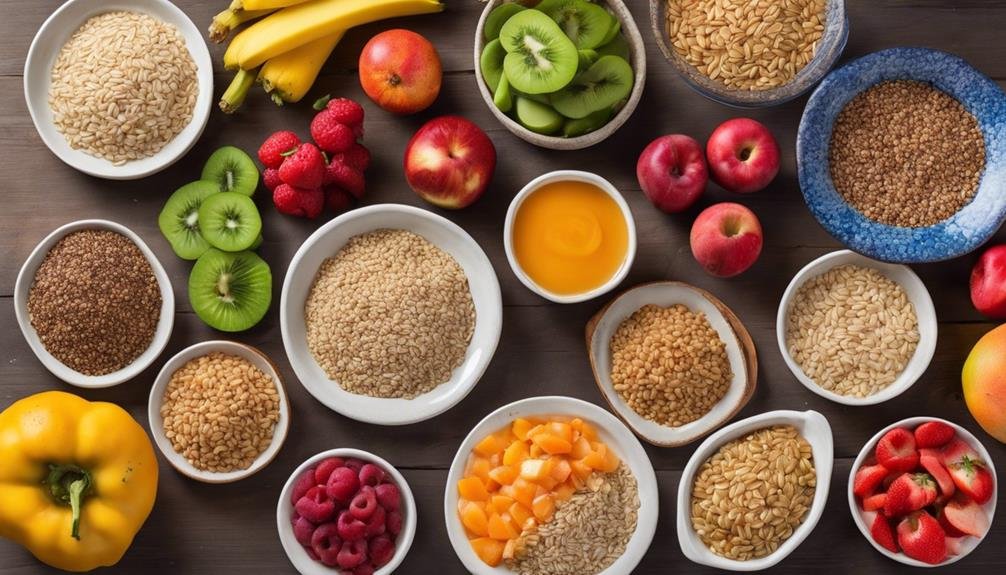You may not realize that certain foods can play a significant role in managing your diabetes effectively. Have you ever considered how leafy greens, berries, fatty fish, nuts and seeds, and whole grains could impact your blood sugar levels?
These top 5 foods are not only delicious but also have properties that can help keep your diabetes in check. Want to discover how these everyday ingredients can make a real difference in your health?
Key Takeaways
- Leafy greens and berries are nutrient-rich, low in sugar, and essential for managing diabetes.
- Fatty fish with omega-3s reduce inflammation and benefit heart health in diabetes management.
- Nuts and seeds provide healthy fats, fiber, and nutrients that support blood sugar control.
- Whole grains with fiber help regulate blood sugar, prevent spikes, and reduce the risk of complications.
Leafy Greens

Leafy greens are essential for managing diabetes due to their rich nutrient content and low impact on blood sugar levels. Including nutrient-packed salads in your daily meals can help regulate blood sugar levels and improve overall health. Spinach, kale, and arugula are excellent choices as they're high in vitamins, minerals, and antioxidants.
Creating delicious and nutritious smoothie recipes with leafy greens is another way to incorporate these powerhouse ingredients into your diet. Try blending spinach or kale with some berries, a banana, and a splash of almond milk for an invigorating and blood sugar-friendly treat.
Nutrient-packed salads provide essential vitamins like A, C, and K, along with minerals such as iron and calcium, which are beneficial for individuals managing diabetes. These greens are also low in calories and carbohydrates, making them a great choice for maintaining a healthy weight. Experiment with different combinations of leafy greens and colorful veggies to create satisfying salads that support your diabetes management goals.
Berries
Berries are a highly recommended fruit choice for individuals managing diabetes due to their low glycemic index and high antioxidant content. The low glycemic index of berries means they have a minimal impact on blood sugar levels, making them a smart option for including in your diabetes management plan. Additionally, berries are packed with antioxidants, such as vitamin C and polyphenols, which can help reduce inflammation and oxidative stress in the body.
Antioxidants play a vital role in fighting against cell damage and supporting overall health. In the case of diabetes, incorporating berries into your diet can provide antioxidant benefits that may help protect against complications associated with the condition. Berries like blueberries, strawberries, raspberries, and blackberries aren't only delicious but also nutrient powerhouses that can aid in keeping your blood sugar levels stable.
Including a variety of berries in your meals, snacks, or even desserts can be a flavorful way to boost your antioxidant intake and support your diabetes management efforts. So, feel free to enjoy a colorful assortment of berries to help control your diabetes more effectively.
Fatty Fish

When managing diabetes, incorporating fatty fish into your diet can be beneficial due to its high omega-3 content and potential impact on blood sugar levels. Omega-3 benefits found in fatty fish like salmon, mackerel, and sardines can help reduce inflammation and improve heart health, which are important considerations for individuals with diabetes. The healthiest way to prepare fatty fish is by grilling, baking, or broiling them to retain their nutritional value without adding extra unhealthy fats. These cooking methods preserve the omega-3 fatty acids better than frying.
For portion sizes, aim to consume fatty fish at least twice a week, with each serving being around 3 to 4 ounces, which is roughly the size of a deck of cards. This amount provides a good dose of omega-3s without overloading on calories. Including fatty fish in your meals can be a delicious and nutritious way to support your diabetes management and overall well-being.
Nuts and Seeds
Incorporating a variety of nuts and seeds into your diet can be beneficial for managing diabetes due to their nutrient-rich profiles and potential impact on blood sugar control. Nuts and seeds are excellent choices for nutrient-rich snacks that can help stabilize blood sugar levels. They contain healthy fats, protein, fiber, and essential vitamins and minerals that support overall health.
When it comes to diabetes management, the omega-3 fatty acids found in certain nuts and seeds are particularly beneficial. Omega-3 benefits include reducing inflammation, improving insulin sensitivity, and lowering the risk of heart disease, which is common among individuals with diabetes.
Including nuts like almonds, walnuts, and seeds such as chia, flax, and pumpkin seeds in your daily diet can provide a satisfying crunch while helping to regulate blood sugar levels. Snacking on a handful of mixed nuts or adding seeds to your salads, yogurt, or smoothies are simple ways to incorporate these diabetes-friendly foods into your routine.
Whole Grains

For effective diabetes management, prioritizing the inclusion of whole grains in your diet can greatly contribute to stabilizing blood sugar levels and improving overall health. Whole grains are packed with essential nutrients and offer various benefits that can aid in controlling diabetes effectively:
- Fiber benefits: Whole grains are rich in fiber, which helps slow down the absorption of sugar into the bloodstream, preventing spikes in blood glucose levels.
- Glycemic index: Whole grains have a lower glycemic index compared to refined grains, meaning they cause a slower and steadier increase in blood sugar levels after consumption.
- Nutrient density: Whole grains contain essential vitamins, minerals, and antioxidants that support overall health and provide sustained energy levels.
- Heart health: Consuming whole grains has been linked to a reduced risk of heart disease, a common complication of diabetes.
- Weight management: Whole grains can aid in weight control due to their fiber content, promoting feelings of fullness and reducing overeating tendencies.
Including whole grains in your meals can be a simple yet effective way to enhance your diabetes management plan.
Frequently Asked Questions
Can I Consume Leafy Greens in the Form of Smoothies or Juices to Help Manage My Diabetes?
You can enjoy leafy greens in salads, smoothies, or juices to manage diabetes. While smoothies can spike blood sugar due to fruit sugars, balance them with high-fiber veggies. Monitor portion sizes for better control.
Are There Any Specific Types of Berries That Are Better for Controlling Blood Sugar Levels?
When managing diabetes, certain berries like blueberries, strawberries, and raspberries have lower glycemic indexes, aiding in blood sugar control. Enjoy them in moderate portion sizes, ideally with meals, for better glucose management.
How Often Should I Eat Fatty Fish in Order to See the Benefits for Diabetes Control?
To benefit from fatty fish for diabetes control, aim for 2-3 servings per week. Incorporate leafy greens daily for added nutrients. Enjoy grilled or baked fish for a healthier preparation. Consistency in fish consumption is key.
Can I Eat Nuts and Seeds as a Snack Throughout the Day, or Is It Better to Consume Them With Meals?
For best nutrient timing and benefits, consuming nuts and seeds as a snack throughout the day can be effective. However, incorporating them with meals can help manage blood sugar levels better, providing sustained energy.
Are There Any Specific Whole Grains That Are More Effective for Managing Diabetes Compared to Others?
When managing diabetes, focus on whole grains like quinoa, barley, and oats. These grains have a lower glycemic index, helping stabilize blood sugar levels. Opt for leafy greens like spinach and kale for added fiber and nutrients.
Conclusion
So there you have it, the top 5 best foods for effective diabetes control.
Remember, you're what you eat, so make sure to incorporate these foods into your diet to help manage your blood sugar levels.
As the saying goes, 'you are what you eat,' so why not choose foods that will nourish your body and support your health goals?
Start incorporating these foods today and see the positive impact it can have on your diabetes management.